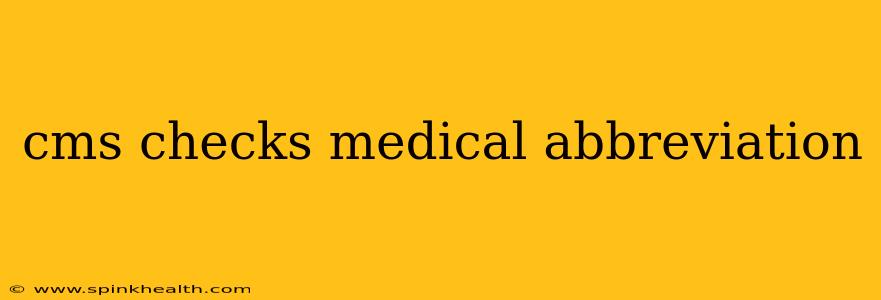The healthcare industry relies heavily on abbreviations. Speed and efficiency are paramount, and shorthand is a deeply ingrained part of the medical workflow. However, this reliance on abbreviations comes with a significant risk: misinterpretations that can lead to serious medical errors. This is where the Clinical Management System (CMS) plays a crucial role—acting as a gatekeeper to ensure accuracy and patient safety. Let's delve into the vital function of CMS checks on medical abbreviations.
Imagine this scenario: a doctor quickly scribbles "O.D." on a prescription. Does it mean "once daily" or "right eye"? The difference could be life-altering. This highlights the potential for catastrophic consequences when abbreviations are ambiguous or misunderstood. This is precisely why many modern CMS platforms incorporate robust abbreviation checking capabilities.
How CMS Checks Medical Abbreviations
Sophisticated CMS systems employ several strategies to detect and flag potentially problematic abbreviations:
1. Pre-defined Dictionaries & Controlled Vocabularies:
The core of the CMS's abbreviation-checking mechanism is its extensive database of medical abbreviations. These dictionaries contain standardized meanings, ensuring consistency. When a user inputs an abbreviation, the CMS instantly cross-references it against this database. If a match is found, the system confirms the intended meaning. However, if the abbreviation is missing or has multiple meanings, an alert is triggered.
2. Contextual Analysis:
Advanced CMS systems go beyond simple dictionary lookups. They analyze the surrounding text to ascertain the intended meaning of the abbreviation. For instance, if the abbreviation "O.D." appears within the context of an ophthalmological report, the CMS is more likely to interpret it as "right eye." This contextual intelligence significantly reduces false positives.
3. Customizable Rules & Exceptions:
No two healthcare facilities operate exactly alike. Some may utilize unique abbreviations or local variations. Modern CMS platforms allow customization, allowing institutions to add their own abbreviations and exceptions to the default dictionary. This ensures that the system remains relevant and effective within the specific organizational context.
Why are CMS Checks for Medical Abbreviations Important?
The significance of CMS checks on medical abbreviations cannot be overstated. They contribute directly to:
-
Improved Patient Safety: By minimizing the risk of misinterpretations, these checks reduce the potential for medication errors, diagnostic errors, and other adverse events.
-
Enhanced Efficiency: While some might argue that abbreviation checking slows down workflow, the prevention of errors more than compensates for the time investment. Correcting mistakes is far more time-consuming than preventing them in the first place.
-
Increased Accuracy: Clear and unambiguous documentation is essential for effective communication and continuity of care among healthcare professionals.
-
Regulatory Compliance: Many healthcare regulatory bodies mandate the use of standardized terminology and the implementation of measures to prevent medical errors. CMS checks for abbreviations directly support these regulatory requirements.
Frequently Asked Questions (FAQs)
What happens when the CMS flags an abbreviation?
When the CMS detects a potentially problematic abbreviation, it usually generates an alert. This alert prompts the user to review the abbreviation and confirm or correct the entry. Some systems might even suggest alternatives.
Can the CMS check all medical abbreviations?
While CMS dictionaries are extensive, they might not contain every single abbreviation in use. Newer or less commonly used abbreviations might require manual review or addition to the system's database.
How can I ensure my CMS is adequately checking abbreviations?
Regularly review and update your CMS's abbreviation dictionary. Keep your system software updated, and participate in training sessions to learn about the system's capabilities and limitations. Collaboration among healthcare professionals to standardize abbreviation usage within your facility is also crucial.
Are there any limitations to CMS abbreviation checks?
Yes. While highly effective, CMS checks aren't foolproof. They rely on the accuracy of the underlying data and the user's attention to the alerts generated by the system. Human oversight remains essential.
In conclusion, CMS checks for medical abbreviations are a cornerstone of modern healthcare technology, contributing significantly to patient safety and efficient care delivery. By minimizing ambiguity and promoting clear communication, these checks play a pivotal role in improving the overall quality and safety of healthcare services.

